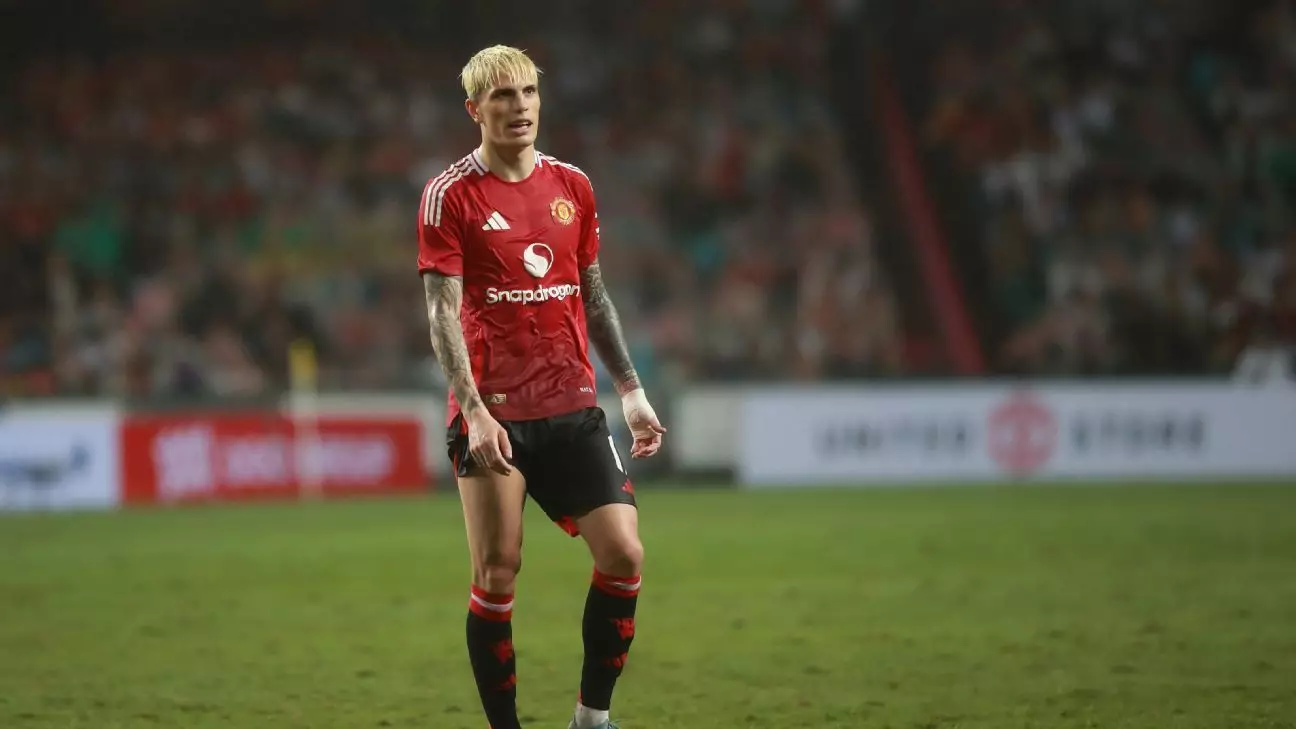Manchester United finds itself at a crossroads, reflecting a club in flux rather than a seamless powerhouse ready to conquer new heights. Under the guidance of manager Ruben Amorim, the Red Devils are adopting an unconventional approach to squad management amid ongoing transfer negotiations. Amorim’s willingness to keep outcast players like Alejandro Garnacho, Antony, Jadon Sancho, and Tyrell Malacia within the fold—even when they are absent from the summer tour in the United States—signifies a strategic gamble. It reveals a certain confidence in the club’s internal dynamics and a belief that patience could yield better results than immediate sales.
However, this approach raises pressing questions about the clarity of Manchester United’s long-term plans. Is this just a tactical pause, or does it hint at deeper issues within the club’s player management and transfer strategy? There’s an inherent risk in leaving key squad members uncertain about their futures, which could breed frustration or even destabilization—particularly if external clubs continue to hold out for last-minute deals. Amorim’s comments suggest he’s ready to restore these players if offers don’t materialize, but such flexibility can be a double-edged sword, potentially undermining team cohesion and the discipline of roster management.
Managerial Confidence Amid Uncertainty
Ruben Amorim’s public stance exudes an optimistic belief in the squad he’s assembled—emphasizing that the current players want to be part of Manchester United and that the club is prepared to start the new season without a definitive No. 9 signing. His openness to potentially beginning the season with the existing squad, including young talents like Josh Zirkzee and Rasmus Højlund, underscores a pragmatic, if somewhat daring, perspective. This flexibility could be a positive demonstration of trust in youth and internal development, but it also reveals a possible lack of a decisive plan.
Furthermore, Amorim’s emphasis on competition and the need for players wanting regular game time suggests a shift toward meritocracy within the squad. Yet, it also highlights a broader dilemma: Is the club relying too heavily on internal options and temporary solutions, risking the quality of their attack? The ongoing hunt for a striker—linked to Ollie Watkins—appears to be more of a secondary concern than a core element of their strategic planning. Such a stance might be manageable in the short term, but it could backfire if injuries or poor form undermine the squad’s balance during the competitive season.
The Broader Implications of Transfer Politics
Man United’s current transfer approach reveals much about the precarious nature of modern football management. While Amorim claims patience might produce surprises and that internal players are ready to step up, the reality is that without decisive signings, United risks entering the season with considerable uncertainty and a sense of disorganization. The club’s failure to secure a reliable striker signals a potential underestimation of competitive pressures, particularly with the season’s early fixtures approaching swiftly.
The fact that players like Rashford are loaned out, and others remain in limbo, hints at a broader issue: the balancing act between nurturing youth talent, managing veteran players, and pursuing strategic signings. The narrative of “players wanting new challenges” and “waiting for transfer negotiations” suggests a club that may be reacting rather than proactively shaping its future. This reactive stance could compromise their chances in multiple competitions, especially if internal issues overshadow on-pitch performances.
Amorim’s transparency about the internal tensions—acknowledging that some players are seeking new teams—could be interpreted as confidence, but it also exposes vulnerabilities. If external clubs leverage this uncertainty, United might be forced into suboptimal deals or risk losing key players without adequate replacements. The delicate dance of managing squad morale, transfer negotiations, and tactical readiness requires not just optimism but strategic clarity, which currently seems elusive.
The Risks and Rewards of a High-Stakes Strategy
Ultimately, Manchester United’s current approach embodies a high-stakes gamble. By leaving the door open to reintegration and showing patience with transfers, they could potentially build a more cohesive squad from within. Yet, this strategy hinges on perfect timing, internal discipline, and a bit of luck—factors that are often unpredictable.
Should this risky patience pay off, the club could benefit from a motivated, unified team that is less dependent on external signings and more anchored in internal resilience and youth development. Alternatively, if negotiations stall, or if key players depart prematurely, the consequences could be detrimental, undermining their season before it even begins.
In this context, Manchester United’s management must grapple with the delicate reality that ambition alone isn’t enough. The balance between hope and pragmatism, especially in a competitive landscape like the Premier League, will determine whether they emerge stronger or falter under the weight of uncertain decision-making. Their future hinges on not just strategic patience, but also on the courage to make decisive moves that align with real-world pressures and the relentless clock of the football calendar.

